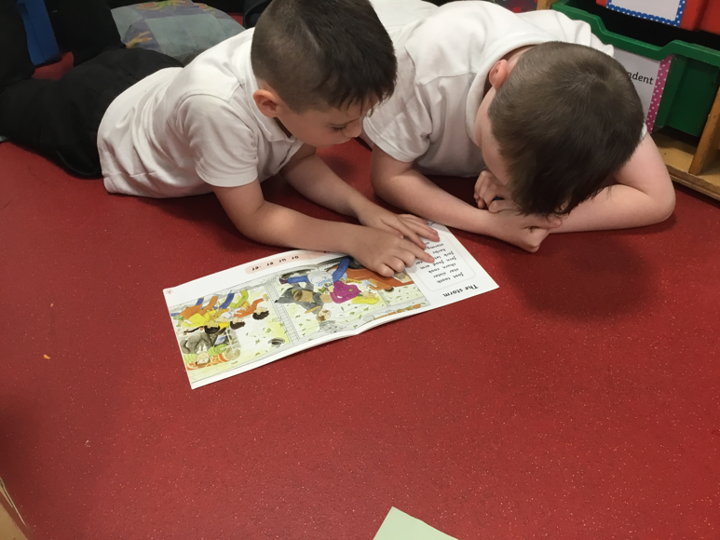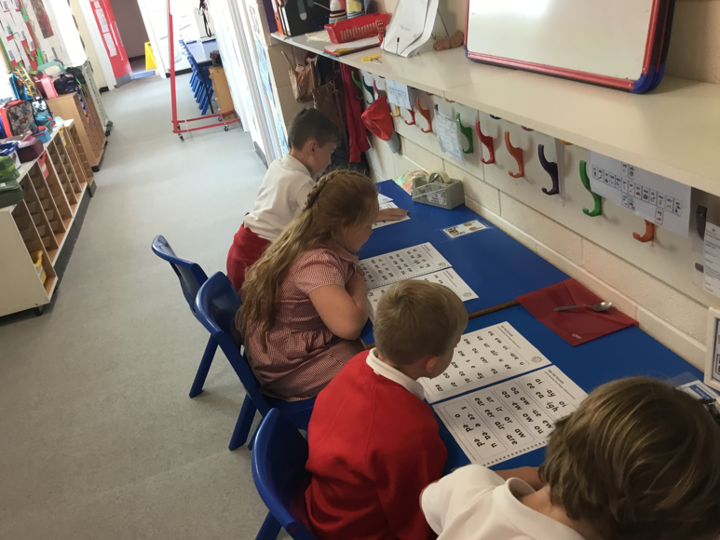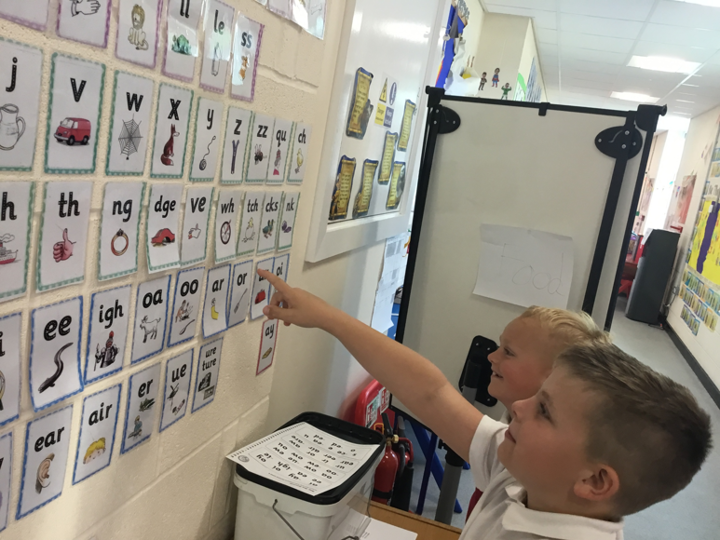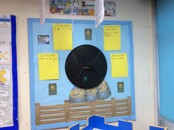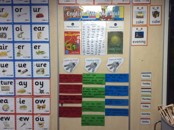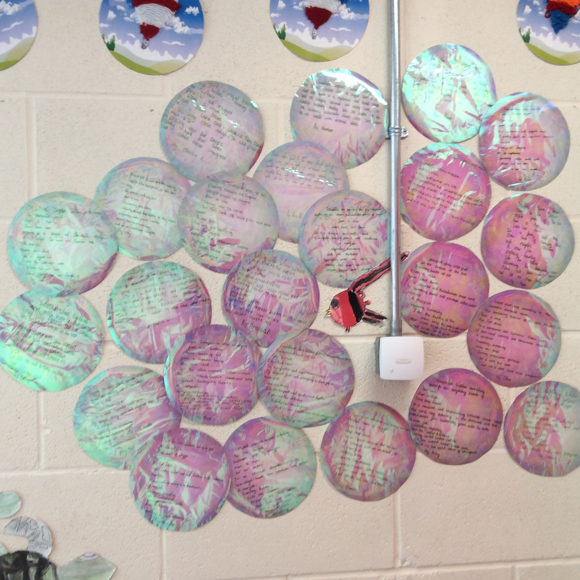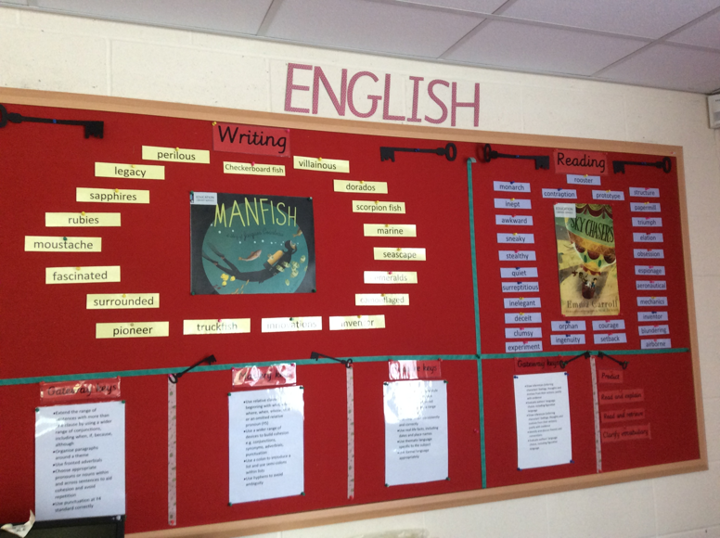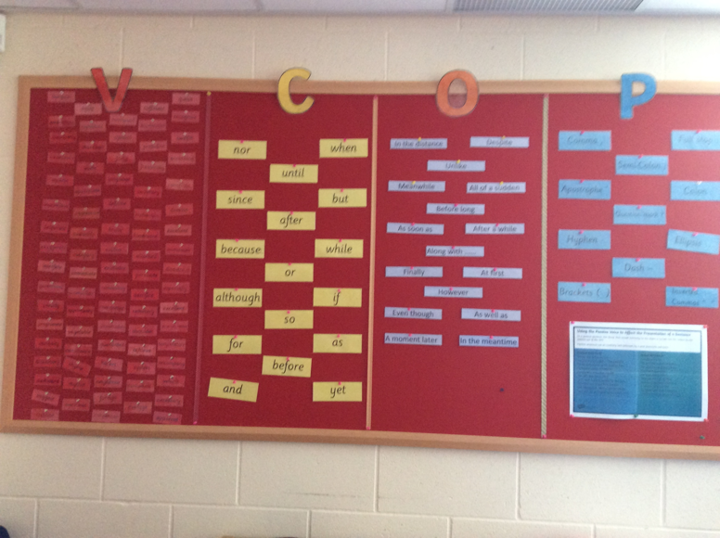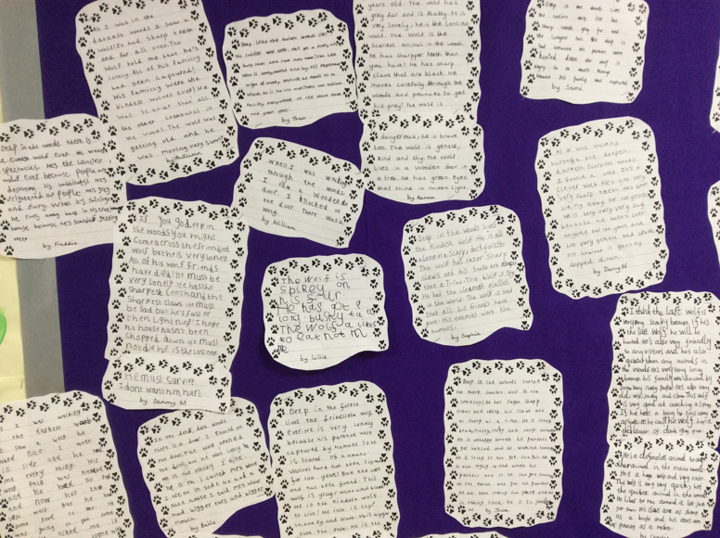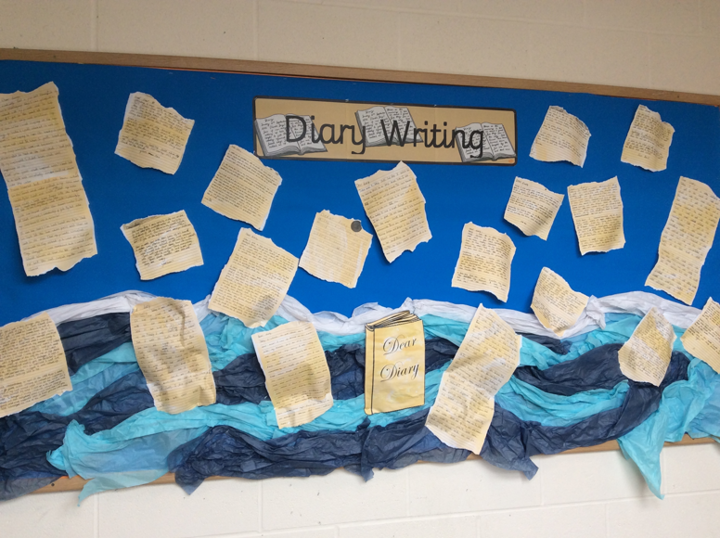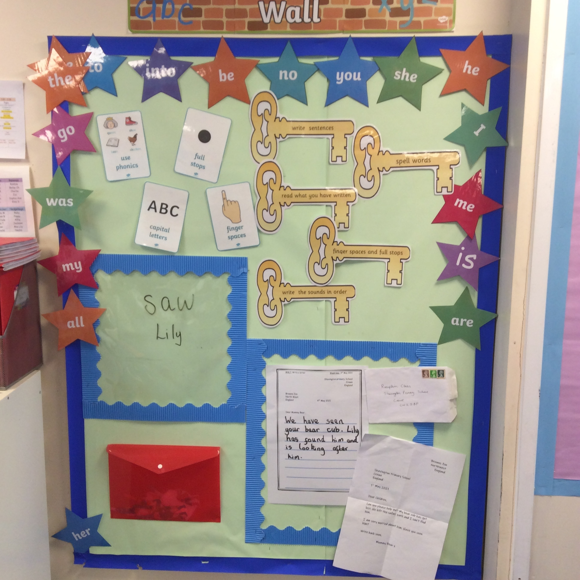Competence in English is essential for a child to succeed in school. We aim to provide children with skills in reading,writing, speaking and listening, to enable them to achieve their potential in all areas of the curriculum.
We are keen to develop an appreciation of language through speaking, listening, reading, writing and drama. These skills are extended through a range of activities in English and other cross curricular areas of the curriculum.
We use the Pathways to read and the Pathways to write to teach reading and writing throughout our school from Reception to year 6. This is a new teaching and learning approach for us and we are excited to start working with Pathways in our Autumn Term.
Pathways teaching reading and writing through a focus exciting key texts; including a range of fiction, non fiction and poetry. The children are exposed to a range of texts and authors to inspire their reading and writing skills.
We also use the Oxford Reading Tree reading scheme within school to support early reading.
Handwriting is taught formally, throughout the school, providing children with the ability to present work to a high standard.
Intervention groups run throughout the school to support children's acquisition of literacy skills.
‘’Once you learn to read, you will be forever free” Frederick Douglass
At Shavington Primary School we are committed to the delivery of excellence in the teaching of phonics. We aim to provide children with the means to read with fluency and confidence and above all to foster a love of reading that will stay with our children throughout their lives.
Intent
At Shavington Primary school we strive to teach children to read effectively and quickly using The Floppy’s Phonics teaching programme. This includes teaching synthetic phonics, sight vocabulary, decoding and encoding words, as well as spelling and accurate letter formation. In addition to this, it also creates a wonderful platform for discussion and comprehension around texts. This structure of teaching uses the phonic phases that are outlined in the ‘letters and sounds’ programme in 5 levels, each with new phonemes to be learnt and increasing with difficulty as you progress through the levels.
We passionately believe that teaching children to read and write independently and as quickly as possible, whilst encouraging them to draw on their BLP animal of resourcefulness, is one of the core purposes of a primary school. These fundamental skills not only hold the keys to the rest of the curriculum but also have a huge impact upon the children’s self esteem and future life chances.
Using the Floppy phonics programme we teach children to:
- Read easily, fluently and with good understanding.
- Encourage them to focus on their BLP animal of reflectiveness to help them to spot new sounds that they can apply to new and unfamiliar words as well as question word meaning to broaden their understanding of a variety of texts.
- To develop the habit of reading widely and often, for both pleasure and understanding.
- To apply their phonic knowledge in both their reading and writing, accurately and coherently.
Implementation
At Shavington Primary school, we recognise that reading and writing is an essential life skill and we are dedicated to enabling our children to become enthused, engaged and successful lifelong readers and writers. To Support this we follow the structure of the Floppy’s phonics scheme.
The Floppy’s Phonics programme teaches the letter/s-sound correspondences of the English alphabetic code explicitly and comprehensively for reading and spelling. It includes the characters of Floppy the dog, Biff, Chip and Kipper and their family and friends, which engages children fully for the phonics teaching & learning, vocabulary enrichment and language comprehension.
Initially children's listening skills are developed through the use of music, environmental sounds and rhyme. During their journey from nursery through the Early Years Foundation Stage and Key Stage 1 they are taught the 44 phonemes (sounds) that make up all the sounds required for reading and spelling. These phonemes include those made by just one letter 'b as in bed' and those that are made by two 'ai as in rain or three letters 'igh as in high'.
Children are taught the key skills of blending sounds together for reading and segmenting (breaking up) words for spelling.
As the children grow in confidence and experience, they are introduced to alternative ways of representing the same sound, eg 'ee' can be represented as 'ee, as in bee', 'ea as in tea', 'e-e as in theme' and 'e as in we'. They also learn when to apply simple spelling rules and use verbs in the correct tense.
We ensure that our teaching of phonics is rigorous, structured and enjoyable. In Reception to Year 2, children have discrete, daily phonics sessions where they are introduced to new phonemes, explore, practise and revise previous learning and have plenty of opportunities to apply the knowledge they have.
We use a range of multisensory strategies to enthuse and engage the children, including the use of interactive whiteboards, grapheme tiles, speaking and listening, and practical activities. Children work with pace and are encouraged to apply their knowledge across the whole curriculum.
Impact
By the time children leave ks1 and progress into ks2, children have a good understanding of the alphabetic code and have become confident resourceful readers and writers who reflect upon their learning. Children have been subjected to a wide variety of texts, both from their own individual reading as well as those shared with the class. As a result, children have a thirst for reading and are able to participate in discussions, ask probing questions and apply their skills across the curriculum.
Throughout the teaching of Floppy’s phonics we are able to measure their attainment after each level and provide children with correct additional support to either help embed their learning or provide them with the next level of challenge. In addition, we are able to see the impact of this programme with their progress in the Year One phonics screening check. We are able to use all this to make sure that the teaching of good synthetic phonics continues to follow those children that need it throughout their primary education.
To give you a bit more information about how we teach Floppy's phonics in school you can access a short video we have put together on the link below.
https://drive.google.com/file/d/1t-GAVS6coEezk3FgtpzEcuCMXzPMNYvQ/view?usp=sharing
Intent
At Shavington Primary, we encourage our children to develop a love of reading by exposing them to a variety of high-quality texts spanning many genres in both a reading a writing capacity. Reading fundamentals are implemented into the curriculum to give our children the best possible basis for developing skills throughout each school year and beyond.
Whilst at Shavington, children are encouraged to explore texts from a wide range of genres to develop fundamental reading skills, and to experience the craft of different authors, looking at vocabulary, style and tone to match the purpose of writing. They will discuss similarities and differences of texts, highlight key themes, look for morals, comment on composition and writing style, whilst also having fun in fantasy lands, travelling around the world to experience stories from other cultures and learning about the wider world. There is a balance of both modern texts, and classic fiction to allow children to experience the difference between authors old and new. This in turn will allow children to explore their own writing interests further when reading for pleasure, and also begin to develop their own writing style.
Our English curriculum aims to ensure that:
- read easily, fluently and with good understanding
- develop the habit of reading widely and often, for both pleasure and information
- acquire a wide vocabulary, an understanding of grammar and knowledge of linguistic conventions for reading, writing and spoken language
- appreciate our rich and varied literary heritage
Implementation
At Shavington, we use the 'Pathways to Read' programme of study from Year 2 to Year 6 to deliver our reading sessions. In Ks1 we use ‘Floppy Phonics’ to deliver phonics teaching to children. This begins in nursery and then continues throughout ks1. This scheme is also designed to be able to support the children who need additional support into ks2, allowing focused intervention that meets the needs of the individual children.
After the recent investment in the ‘Floppy’s Phonics’ scheme we have now stocked the EYFS/Key Stage 1 library with a range of books for each phonics phase. The Floppy’s Phonics programme teaches the letter/s-sound correspondences of the English alphabetic code explicitly and comprehensively for reading and spelling. It includes the characters of Floppy the dog, Biff, Chip and Kipper and their family and friends, which engages children fully for the phonics teaching & learning, vocabulary enrichment and language comprehension.
We use the Education Library service to provide a range of books for KS2, which are renewed on a termly basis. This allows for maximum exposure to a variety of genres and authors. Each classroom had a dedicated library area that allows children to choose their own literature and promotes a love of reading within the classroom. More recently, KS2 have been using the online application Bug club. This allows children to have an assigned reading level, and access books online in a variety of areas of interest. By using this, it allows the children to access an online library, and each book come with added ‘bug’ questions that children need to answer using a variety of comprehension skills. During remote learning, we have also used CGP reading guides with our children. This allows children to continue to practice their comprehension skills effectively, whilst reading a further variety of short extracts.
At Shavington, we identify children who need support and provide quality intervention in the most effective and efficient way that we can. We run intervention reading groups, and recently invested in the programme ‘Nessy’. Most children on the SEND register have reading and comprehension as one of their targets.
Teachers typically plan and teach at least three 20-minute whole-class lessons using our Pathways to Read scheme, using quality text examples, which focus heavily on developing vocabulary and practising the key reading skills of inference; prediction; explaining; retrieval; summarising. We help each child maximise their potential by providing help and support where necessary, whilst striving to make children independent workers once we have helped to equip them with the confidence, tools and strategies that they need.
Impact
Our aim is for children to become fluent and confident readers by the end of Key Stage One. By the implementation of early systematic phonics, we aim to encourage children to develop their fluency and comprehension as they progress into Key Stage Two. To measure the impact of our phonics and reading schemes, we firstly measure attainment in phonics against the Phonics Screening Test at the end of Year 1. In reading, we (until recently following the Government decision to suspend KS1 statutory testing) used the statutory standardised testing at the end of Key Stage 1 and 2. These results were measured against the reading attainment of children nationally. We also use an in-house statutory testing scheme that allows teachers to make judgements of progress f children in each year group, allowing for targeted interventions, and a smooth transition between year groups. Above all, we are proud to offer children a broad and balanced variety of literature allowing them to fully immerse themselves in topics, fantasy lands, far away cultures and in real life situations. Our aim through reading is promote a love of reading, and an understanding of literature, in a range of different ways.
Intent
Writing is an integral part of our curriculum. We intend our children to develop a love of writing and to be able to express their thoughts and ideas clearly and creatively through the written word. We intend our children to be reflective learners by re-reading, editing and improving their writing and to be able to confidently use the essential skills of grammar, punctuation and spelling. At Shavington, we set high expectations for all our children to take pride in their work and we have a fluent, joined handwriting style, allowing their imaginations to flourish.
Implementation
The ‘Pathways to Write’ programme from the Literacy Company is a proven methodology built around units of work which develop spoken language, vocabulary, reading and writing skills through the mastery approach.
Our writing, from Reception to Year 6, is taught using the Pathways scheme – which is based on some beautiful and thought-provoking picture books and texts to engage children in writing. The units have been designed to aid and guide progression, as well as the tracking of skills throughout each year group. The mastery approach teaches children to master the skills of writing by focusing on particular techniques throughout a unit of work. As a result, the children are given many opportunities to practise and apply these skills until they have mastered them. As they become more confident, children are taught to write in different contexts, for different purposes and to apply language rules and traditions for effect.
Each Pathways unit journeys to a final extended writing outcome where the children’s success relies on their application of the mastery keys. However, contained in the journey are many ‘short burst’ writing opportunities, where the children can explore a wide variety of genres and practise specific mastery skills through shared, guided and independent writing.
Children are expected to apply their writing skills and knowledge in cross curricular lessons; teachers provide extended writing opportunities to ensure children can write for sustained periods of time and at length. During all writing activities, high expectations and standards of writing in terms of composition, word selection, spelling and punctuation are expected.
We provide time for the children to reflect on their writing – evaluating and editing their work to make improvements. We encourage collaborative work where the children share their work with each other, providing feedback against the mastery keys. Writing toolkits including dictionaries, thesauruses, vocabulary mats, genre features and model texts are easily accessible.
Our young authors’ accomplishments are celebrated through classroom writing displays.
Impact
We want all of our children to develop a love for writing and enjoy showcasing their developing skills and sharing their ideas across a variety of genres.
Children’s progress in writing is tracked through regular summative and formative assessment including a “Friday Write”. Writing is teacher assessed against year group expectations; this is supported using the Teacher Assessment Frameworks for Year 2 and Year 6. Writing is moderated internally, and externally within a cluster of schools.
The impact of teaching and learning of writing is carried out through learning walks, chats with children, discussions of work within school books, data analysis and progress meetings. Work is planned to address misconceptions and gaps in learning identified through assessments to ensure that the curriculum effectively meets the needs of all pupils.
We are keen to develop an appreciation of language through speaking, listening, reading, writing and drama. These skills are extended through a range of activities in English and other cross curricular areas of the curriculum.
Intent
Speaking and listening is central to our Shavington Curriculum and is developed from EYFS throughout our school, across the curriculum. We nurture children’s speaking and listening skills through a variety of approaches: exploratory play, Story time, role play and pre-teaching curriculum specific vocabulary. We develop these skills so that our children are capable of expressing their own ideas clearly and confidently, in a safe and supportive environment, in all aspects and areas of their school life and beyond.
Implementation
All staff in our school model the use of higher-level vocabulary within their speech and expanding children’s vocabulary is a key focus from EYFS. Our school follows the Floppy Phonics scheme, to enhance children’s phonetic knowledge. We have just started using Pathways to read and write to help enrich and expand children’s vocabulary. Subject specific vocabulary is embedded across the curriculum, through teacher modelling, in context. Contextual learning helps children to understand new words and supports them to use this vocabulary in their work. This model is reflected in shared and guided reading sessions, where children are given the chance to explore unfamiliar vocabulary and expand their knowledge of words, encouraging them to become resourceful beavers. We are keen to model the correct grammar in speech. Children are given the chance to orally rehearse ideas for writing regularly.
We work in collaboration with Speech and Language specialists within Cheshire East and across our Learning for Life Partnership. Our staff take part in mutual sharing and training sessions throughout our multi academy trust. The targeted children are invited to work with Elklan trained speech and language specialist teaching assistants. By having one to one sessions, the children are encouraged to correct their mistakes in a safe and fun environment, therefore giving them the confidence to engage in larger group activities and promote their resilience.
Impact
Speaking and listening give us the basic skills we need to communicate with the world around us. Children are given a range of opportunities to develop these skills, in a safe and stimulating environment. The wide range of speaking and listening activities – which are weaved throughout our curriculum – help to develop ideas, vocabulary and confidence, as the more we talk, the more we pick up on different words that other people use.




